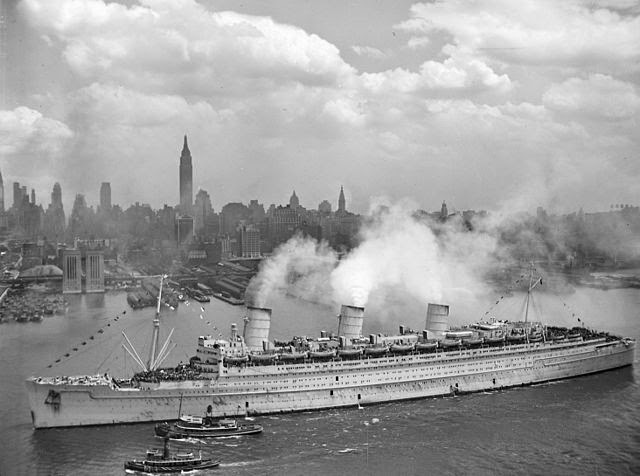The RMS Queen Mary is an ocean liner that sailed across the
North Atlantic from 1936 until 1967 for the Cunard Line. She was retired from service and left
Southampton, England on 31st October 1967, arriving at her new home
of Long Beach, California where she remains moored. The ship is on the National Register of
Historic Places.
 |
| RMS Queen Mary docked in Long Beach (Wikipedia) |
History of the ship
The Queen Mary was built in the John Brown & Company
Shipbuilding and Engineering shipyard on the River Clyde at Clydebank in
Scotland. Work began in 1930, was halted
in 1931 due to the Great Depression and was completed in 1934, along with her
sister ship, the Queen Elizabeth. The ship
was named for Mary, consort of King George V.
The Queen Mary sailed her maiden voyage from Southampton on
27th May 1936, headed for New York.
On board facilities included two indoor swimming pools, beauty salons, a
music studio, outdoor paddle tennis courts and dog kennels. To keep the children occupied, there were
nurseries, a library and a lecture hall.
The largest room was the first class main dining room, or grand salon,
which was three stories high while the cabin class swimming pool was two decks
in height. She was the first ocean liner
to have her own Jewish prayer room – proof of anti-racism at the time of Nazi
Germany.
War record
Late August 1939 saw the Queen Mary returning from New York
to Southampton with a battlecruiser escort, HMS Hood. This was in light of the growing tensions
that would lead to the outbreak of World War II. In March 1940, the Queen Mary, along with the
Queen Elizabeth and the Normandie, the three largest cruise liners in the
world, were forced to sit idle due to the war.
 |
| New York 1945 (Wikipedia) |
It was decided to use them for troopships but during the
outfitting, the Normandie was destroyed by fire. Queen Mary was sent to Sydney, Australia
where she brought Australian and New Zealand soldiers back to the UK. Incidentally, at this time, her
superstructure and funnels were painted navy grey to help camouflage her and
she was given the nickname the Grey Ghost.
During a voyage in 1942, the ship accidentally sank one of
her escorts, the light cruiser HMS Curacoa with the loss of 239 lives. Later that year, she carried 16,082 American
soldiers from New York to the UK, a standing record for the most passengers
ever transported on one ship. During the
voyage, she was hit with a 92 ft. wave that nearly capsized her and calculations
later estimated that she rolled 52 degrees and had she gone 3 degrees further,
she would have capsized. This incident
was said to be the inspiration for the story The Poseidon Adventure by Paul
Gallico that was later made into a film.
Post War
The Queen Mary was refitted for passenger service between
1946-47 and with her sister ship, continued to dominate the transatlantic
passenger trade in the 1940s and 1950s. Passenger
numbers began to drop with the first transatlantic jet crossing but through the
1960s both ships still averaged 1000 passengers per journey. However, by 1965, the entire Cunard fleet was
operating at a loss and both ships were forced to retire and sold off.
When she retired, the Queen Mary had carried 2,112,000 passengers
and sailed for 3,792,227 miles in her years of service, completing her 1,000th
crossing of the North Atlantic to reach her new home.
Hauntings
The Queen Mary is now operated as a hotel and since the 1980s,
there have been a score of reports of hauntings and strange happenings. The floating hotel and museum that the ship
now is has been called one of the most haunted places in the world with some
estimates around 150 different ghosts on board.
The First Class Swimming Pool is said to be haunted by the
ghosts of two women who both drowned in it at different times. One dates from the 1930s while the other from
the 1960s. Ghostly wet footprints are
often reported around the pool and the sounds of splashing water have been
heard even though the pool is empty. The
dressing rooms associated with the pool have often been reported to have
strange, negative vibes and be a portal for ghostly visitors to travel from one
dimension to another.
A young girl nicknamed Jackie has been seen playing hide and
seek in the area originally the second-class pool and singing nursery
songs.
The engine room is a particularly busy spot in ghostly
terms. It was used for the filming of
The Poseidon Adventure film and at least two men have been killed by one single
door in the room. Door 13 has been said
to have been crushed to death two men, the most recent in 1966 when an 18-year-old
working on the crew was killed by it. His
ghost, in blue coveralls and with a beard, has been seen walking along Shaft
Alley before vanishing through Door 13.
 |
| Grand Salon (Wikipedia) |
The Queen’s Salon, the first class lounge, has the ghost of
a young woman in a white evening gown who is seen dancing in the corner of the
room.
A tall, dark haired man in 1930s style clothing has been
seen in the first-class staterooms who may or may not be connected with reports
of water running, lights turning on and off and phones ringing when no one is
on the other end.
In the third class children’s nursery, a baby crying is
heard, believed to be an infant boy who died just after birth on the ship.
Across the ship, there have been reports of disembodied
screams, phantom footsteps, sound and smells with no explanation and voices in
empty rooms.
Sources:
No comments:
Post a Comment